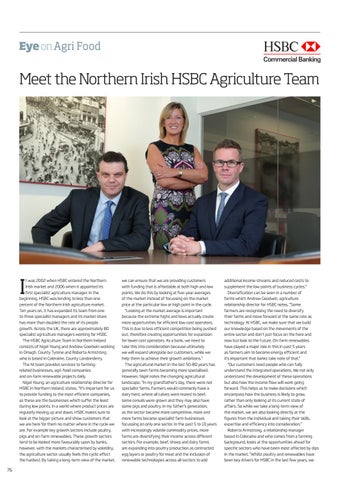Eye on Agri Food
Meet the Northern Irish HSBC Agriculture Team
I
t was 2002 when HSBC entered the Northern Irish market and 2006 when it appointed its first specialist agriculture manager. In the beginning, HSBC was lending to less than one percent of the Northern Irish agriculture market. Ten years on, it has expanded its team from one to three specialist managers and its market share has more than doubled the rate of its people growth. Across the UK, there are approximately 80 specialist agriculture managers working for HSBC. The HSBC Agriculture Team in Northern Ireland consists of Nigel Young and Andrew Goodwin working in Omagh, County Tyrone and Roberta Armstrong who is based in Coleraine, County Londonderry. The NI team provides services to farmingrelated businesses, agri-food companies and on-farm renewable projects daily. Nigel Young, an agriculture relationship director for HSBC in Northern Ireland, states, “It’s important for us to provide funding to the most efficient companies, as these are the businesses which suffer the least during low points. In a world where product prices are regularly moving up and down, HSBC makes sure to look at the bigger picture and show customers that we are here for them no matter where in the cycle we are. For example key growth sectors include poultry, pigs and on-farm renewables. These growth sectors tend to be looked more favourably upon by banks, however, with the markets characterised by volatility, the agriculture sector usually feels this cyclic effect the hardest. By taking a long-term view of the market,
76
we can ensure that we are providing customers with funding that is affordable at both high and low points. We do this by looking at five-year averages of the market instead of focussing on the market price at the particular low or high point in the cycle. “Looking at the market average is important because the extreme highs and lows actually create more opportunities for efficient low-cost operators. This is due to less efficient competition being pushed out, therefore creating opportunities for expansion for lower cost operators. As a bank, we need to take this into consideration because ultimately we will expand alongside our customers, while we help them to achieve their growth ambitions.” The agricultural market in the last 50-80 years has generally seen farms becoming more specialised. However, Nigel notes the changing agricultural landscape, “In my grandfather’s day, there were not specialist farms. Farmers would commonly have a dairy herd, where all calves were reared to beef, some cereals were grown and they may also have some pigs and poultry. In my father’s generation, as the sector became more competitive, more and more farms became specialist farm businesses focussing on only one sector. In the past 5 to 10 years with increasingly volatile commodity prices, more farms are diversifying their income across different sectors. For example, beef, sheep and dairy farms are expanding into poultry production as contracted egg layers or poultry for meat and the inclusion of renewable technologies across all sectors to add
additional income streams and reduced costs to supplement the low points of business cycles.” Diversification can be seen in a number of farms which Andrew Goodwin, agriculture relationship director for HSBC notes, “Some farmers are recognising the need to diversify their farms and move forward at the same rate as technology. At HSBC, we make sure that we build our knowledge based on the movements of the entire sector and don’t just focus on the here and now but look to the future. On-farm renewables have played a major role in this in past 5 years as farmers aim to become energy efficient and it’s important that banks take note of that.” “Our customers need people who can fully understand the integrated operations. We not only understand the development of these operations but also how the income flow will work going forward. This helps us to make decisions which encompass how the business is likely to grow, rather than only looking at its current state of affairs. So while we take a long-term view of the market, we are also looking directly at the figures from the individual and taking their skills, expertise and efficiency into consideration.” Roberta Armstrong, a relationship manager based in Coleraine and who comes from a farming background, looks at the opportunities ahead for specific sectors who have been most affected by dips in the market, “Whilst poultry and renewables have been key drivers for HSBC in the last few years, we
